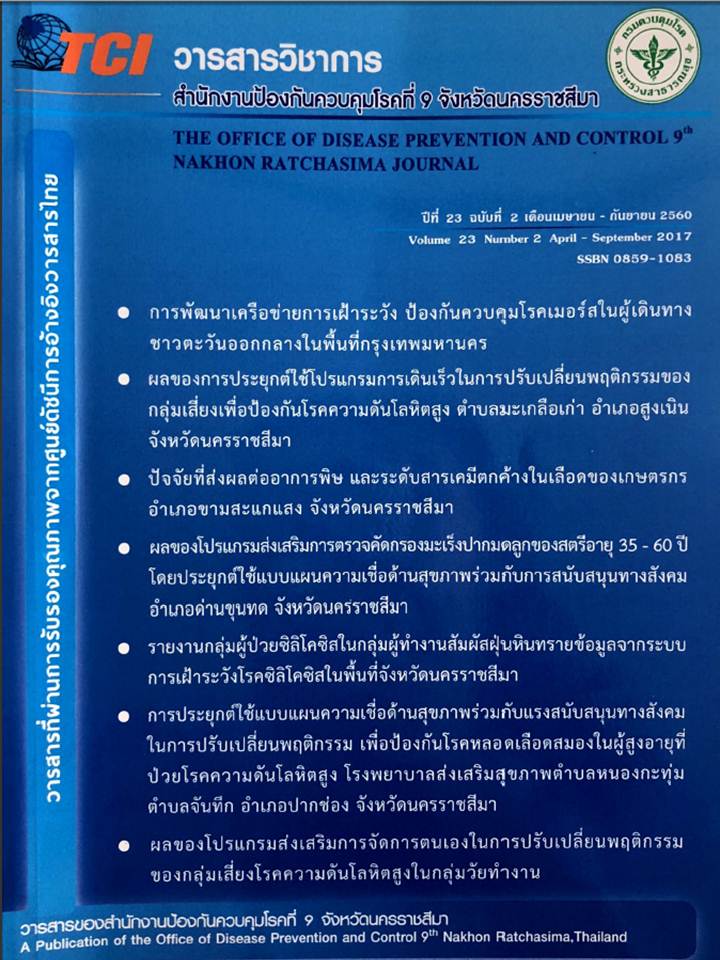The Development of Surveillance, Prevention and Control Network of MERS-CoV in the Middle East travelers in Bangkok
Keywords:
Middle East Respiratory Syndrome, MERS-CoV, Middle East countriesAbstract
In Thailand 2015, one patient who was Middle East was identi ed as infected with MERS-CoV
or MERS. In this case, there are risks to nd the new infected cases because many Thai pilgrims going
to participate in the Hajj in the Middle East countries every year. There are also numerous travelers
from the Middle East countries visiting Thailand. The followings are the objectives of the study. First,
to develop networks in prevention and control of MERS-CoV in community in forms of structure
and mechanic system of networks. Second, to empower off i cers to have the knowledge and realize
of severity of MERS-CoV. Third, to provide Mers-CoV prevention for the travelers more
appropriately after the outbreak and identify infected patients more rapidly. Lastly, to evaluate the
ef f icience of operations on surveillance, prevention and control Mers-CoV in the community. The study
was designed in terms of Research and Development. The targeted areas were the hotel that the patient
with MERS-CoV from Middle East had stayed and also the place around the hotel. The targeted groups
of the study are hotel executives, hotel managers, hotel staffs, care takers of the mosques, pharmacy
owners, and the private clinic owners. The operations composed of the survey, the questionnaires,
in-depth interview, training workshops and also following and evaluating the operations continuously.
The duration of the process had been from June 2015 to July 2016. The study results found that
representatives from the establishments who are also community volunteers will focus on screening
the suspected patients. If they found the suspected patients, they would report via phone and group
line within 24 hours to the Off i ce of Disease Prevention and Control and healthcare centers, which
are the main centers to inform and help support the resources and devices. From the continued
follow-up every 3 month and 6 month, we did not nd the suspected Mers-CoV patients. While the
realization and acknowledgement of Mers-CoV in staff of hotels where patients used to stay, we found
that there are reports about the outbreak to hotel staff and travelers about 81.2%. Those showed the
awareness and wakefulness in surveillance, prevention and control. Moreover, hotels also focused
on the symptoms of patients. For the guest who was suspected to be infected with MERS-CoV,
the hotel would take care him/her closely. To elaborate, the hotel would provide the isolation place
for the suspected guest and assigned hotel maids to inspect whether there were another suspected cases
or not. In this case, it could be reassure that if the suspected guests were really infected with MERS-CoV,
they would not spread the infection to others. While, the operations of associated networks around
the hotel that visitors stayed found that hotels, mosques, pharmacy shops and private clinics had
knowledge and followed the instructions of Department of Disease Control strictly. From this study,
it shows that the Prevention and Control of MERS-CoV in collaboration with the Development
of partnership networks in communities are really necessary and signi cant to the preparation for
MERS-CoV Outbreaks. Therefore, there should be the forming of volunteer teams that understand
profoundly about cultures and languages of the Middle East countries so that they can do the data
communication with the travelers from those countries and also bring the forms of the surveillance, prevention
and control to publicize more necessary data about how to prevent MERS-CoV to the travelers
via much more channels, such as Social Medias, other media, and so on.
References
About MERS. [Internet]. 2016 [cited 2016 Sep 30]; Available from: http://www.cdc.gov/
coronavirus/ mers/ about/index.html.
2. World Health Organization. Middle East respiratory syndrome coronavirus (MERS-CoV) – Saudi
Arabia. Disease outbreak news 4 January 2016. [Internet]. 2016 [cited 2016 June 19];
Available from: http://www.who.int/csr/don/4-january-2016-mers-saudi-arabia/en/.
3. สำนักโรคติดต่ออุบัติใหม่ กรมควบคุมโรค. โรคทางเดินหายใจตะวันออกกลางหรือโรคเมอร์ส. [อินเตอร์เน็ต].
2014 [สืบค้นเมื่อวันที่ 19 มิถุนายน 2559]; เข้าถึงได้จาก: http://beid.ddc.moph.go.th/beid_2014/
sites/default/ les/upload/ les/mers_original190658.13.00.pdf.
4. กรมการท่องเที่ยว. สถิตินักท่องเที่ยวชาวต่างชาติที่เดินทางเข้าประเทศไทย ปี 2558. [อินเตอร์เน็ต]. [สืบค้น
เมื่อวันที่ 3 กันยายน 2559]. เข้าถึงได้จาก: http://www.tourism.go.th/home/details/11/221/24710.
5. ไพฑูลย์ ไกรพรศักดิ์. โครงการวิเคราะห์อุปสงค์ต่อการท่องเที่ยวของกลุ่มนักท่องเที่ยวจากต่างประเทศและ
จากกลุ่มประเทศตะวันออกกลางในประเทศไทย. สรุปรายงานการวิจัยชุด: ความสัมพันธ์ทางเศรษฐกิจ
ระหว่างประเทศไทยกับประเทศในตะวันออกกลาง. 2554 ; 25-41.
6. มณิศรี พันธุลาภ. นโยบายและการให้บริการทางด้านสุขภาพของกลุ่มประเทศตะวันออกกลางในประเทศไทย.
สรุปรายงานการวิจัยชุด: ความสัมพันธ์ทางเศรษฐกิจระหว่างประเทศไทยกับประเทศในตะวันออกกลาง.
2554; 5-24.
7. โครงสร้างงานโรงแรม : Hotel Organization Chart. [อินเตอร์เน็ต]. [สืบค้นเมื่อวันที่ 26 มีนาคม 2560]; เข้าถึง
ได้จาก: http://hotelorganizationchart.blogspot.com/2012/01/hotel-organization-chart.html.
8. สำนักงานรับรองคุณภาพร้านยา. มาตรฐานร้านยา (Standard of Drugstores). [อินเตอร์เน็ต]. [สืบค้น
เมื่อวันที่ 11 กุมภาพันธ์ 2560]; เข้าถึงได้จาก: http://www.pharmacycouncil.org/ index.php?
option=content&menuid=39.
9. อับดุลเลาะ หนุ่มสุข. บทบาทของมัสยิดในการพัฒนาชุมชนอย่างยั่งยืน. [อินเตอร์เน็ต]. [สืบค้นเมื่อวันที่
11 กุมภาพันธ์ 2560]; เข้าถึงได้จาก: http://www.islammore.com/view/377.
10. พีระพล ศิริไพบูลย์. แนวทางการพัฒนาบทบาทอาสาสมัครสาธารณสุข ต่องานสาธารณสุขมูลฐาน กรณีศึกษา
เขตพญาไท. วารสารวิทยบริการ 2553 ; 21(2): 30-44.
11. สำนักระบาดวิทยา กรมควบคุมโรค. Ebola Haemorrhagic Fever. [อินเตอร์เน็ต]. [สืบค้นเมื่อวันที่
3 กันยายน 2559]. เข้าถึงได้จาก: http://www.boe.moph.go.th/fact/Ebola.htm.

Published
How to Cite
Issue
Section
License
Articles published in the Journal of the Office of Disease Prevention and Control 9 Nakhon Ratchasima are the copyrighted property of the Office of Disease Prevention and Control 9 Nakhon Ratchasima.



